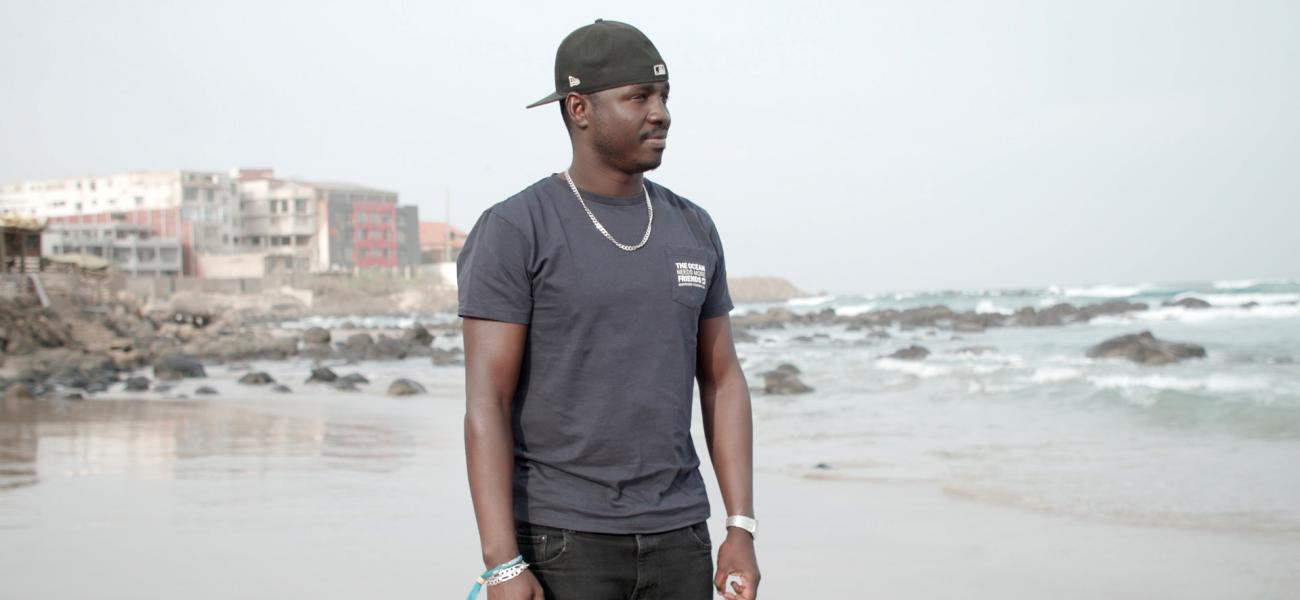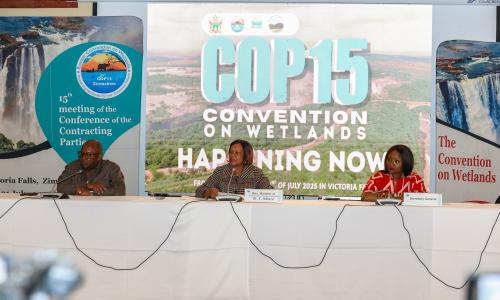“What began with banning plastic straws turned into a national movement.”
That’s how Babacar Thiaw — surfer, restaurateur, and environmental advocate — sums up his experiment on the shoreline of Dakar, Senegal’s capital city. At the core of his mission is Copacabana Surf Club, a popular beachfront restaurant in one of the affluent yet historic neighborhoods of the city. In his restaurant, food, surfing, and sustainability come together for an environmental cause.
Yet Thiaw’s journey didn’t begin with a policy, a grant, or a global campaign. It started with a wake-up call while surfing on the polluted water along a stretch of the shoreline.
Out on the waves, surfing with friends off the coast of Dakar in the early 2010s, it gradually dawned on Babacar that the sea was full of plastic.
“Every single day we went surfing, we had to push aside floating bottles, wrappers, bags — it was everywhere,” he recalls. “I started getting angry. I asked myself, ‘Is this the kind of environment I’m condemned to live in for the rest of my life?”
The image stayed with him. He didn’t have the resources to act immediately, but something inside shifted. For years, that feeling of helplessness fueled Babacar's drive to make a difference.
By 2019, Babacar was ready to act, starting with his own business. His goal was simple but ambitious: eliminate all single-use plastics from his Copacabana Surf Club.
That meant no plastic straws, no plastic bottles, no individually packaged condiments or coffee pods — nothing that would end up in the ocean or landfill.
“It was a challenge. People weren’t used to having their bottles refilled or drinking from bamboo straws. Even my staff didn’t get it at first. I had to explain the ‘why’ behind everything.”
Babacar teamed up with Zero Waste Senegal, a local environmental association to find sustainable alternatives. Together, they sourced bulk goods, reusable glass bottles, and eco-friendly materials like bamboo straws from Bali, Indonesia, and metal straws from Germany.
The switch worked. Within months, plastic waste at the restaurant dropped by 35%.
“It was proof that this was possible. That change could be real, not just for the image — but for the planet.”
Customers react
At first, Babacar worried that customers might resist the changes. Instead, something remarkable happened: they embraced it.
“People started asking questions — ‘How did you do this? Why did you do it?’ — and I loved having those conversations,” he says. “It helped them see that it wasn’t just about business. It was about community, about legacy.”
For Babacar, this was never a marketing ploy. It was personal. he said his passion for the ocean, and his deep respect for the land and traditions of his ancestors, who lived sustainably long before plastic existed — made this work a moral responsibility.
A label for change
Realizing he couldn’t do it alone, Babacar reached out to other restaurants. Working with local associations, he helped develop a three-tier certification system to promote low-waste practices:
- Level 1: No plastic bottles
- Level 2: No plastic straws
- Level 3: No coffee pods or single-serve plastics
Restaurants that complete all three become officially recognized as “Zero Waste Restaurants.”
“We knew not every place could do everything at once. But we wanted to create a path — step by step — to get them involved.”
As of 2024, at least 67 restaurants across Senegal have adopted the label.
“And it’s not just about the environment,” Babacar adds. “Going zero waste also builds customer loyalty. People want to support places that are trying to do better.”
Beyond the surf club: activism in action
Though it began in his restaurant, Babacar’s vision quickly expanded. In 2020, he co-founded the Surfrider Foundation Senegal, a local branch of the global nonprofit dedicated to protecting oceans and coastlines.
Their first action? Clean up the beaches. Their second? Start monitoring the water.
“Everyone talks about trash on the beach, but no one was testing the water itself. So, we started collecting samples weekly from six popular beaches.”
The team tests for E. coli and Enterococcus, bacteria that indicate the presence of raw sewage. While Senegal has official water safety standards for bottled water, there don’t appear to be established guidelines for other water sources. Surfrider hopes to help change that. In the meantime, they use European benchmarks as a reference.
“We’re building a database that will help us lobby the government. When we finish in 2025, we’ll have enough data to demand change. You can’t argue with science.”
Another initiative took a more practical form: trash cans. Lots of them.
With support from a $10,000 grant from the Aloha Foundation, Babacar purchased 100 sturdy bins and distributed them across six public beaches. He partnered with city officials to arrange trash collection every two days.
“People were running up to me saying, ‘We need more trash cans!’ That told me everything I needed to know.”
A vision for the future
Looking ahead, Babacar’s vision is clear — and urgent:
“There should be no untreated sewage going into our oceans.” In five years,” he quips, “No, in two years. That’s the goal.”
He is aware that the journey won’t be easy. But with his team at Surfrider, support from the community, and growing pressure on public institutions, he believes it’s possible.
“We’re not asking for billions. Just common sense and commitment. A little investment [through action] can go a long way.”
To others dreaming of launching a project or making an impact, Babacar has simple advice:
“Talk to people. Share ideas. Don’t wait to be perfect — just start. If you’re healthy, you already have the greatest asset. Let’s build a better place to live.”





